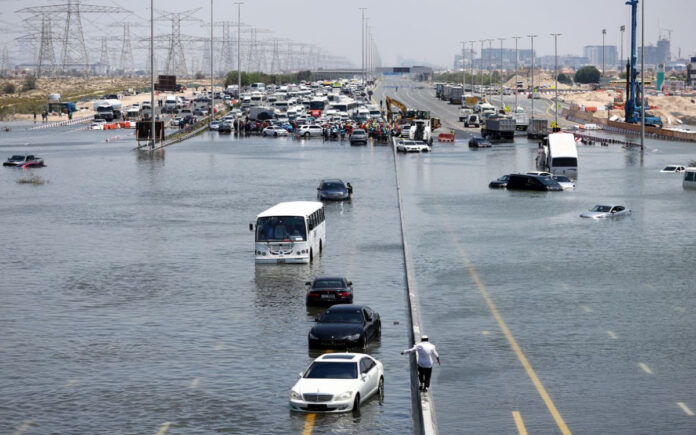London: A recent rapid analysis by climate researchers from the World Weather Attribution Group indicates that heavy rainfall events during El Niño years, such as the recent occurrence in Dubai and other parts of the United Arab Emirates (UAE) and Oman on April 14-15, may have intensified by 10-40% due to the climate crisis.
El Niño, a natural climate phenomenon characterized by ocean surface warming in the central and eastern tropical Pacific Ocean, has far-reaching impacts on weather patterns, including heavy rains, floods, and droughts, occurring every two to seven years and lasting for about nine to twelve months.
While researchers couldn’t precisely quantify the direct impact of climate change due to disparities between model results and observations, they suggest that the escalating rainfall is likely attributed to the warming caused by the burning of fossil fuels, rather than cloud seeding, a common practice in the UAE for rainfall augmentation.
Friedrike Otto, a climate scientist at Imperial College London’s Grantham Institute – Climate Change and the Environment, noted the challenges of studying heavy rainfall in hyper-arid areas like the Arabian Peninsula but emphasized that a warmer atmosphere, capable of holding more moisture due to global warming, could contribute to increased precipitation.
Also Read | UK Couple Arrested for Dining-and-Dashing: Owed £1,000 After 5 Restaurant Feasts
Mansour Almazroui from the Center of Excellence for Climate Change Research highlighted the rarity of rainfall events in the region, citing instances of extreme rainfall over the years, with recent data showing a significant uptick in precipitation.
The study underscores the urgent need to address climate change, emphasizing that continued reliance on fossil fuels will lead to deadlier and more destructive floods, posing significant risks to vulnerable populations in flood-prone areas like the UAE and Oman.
Despite proactive disaster risk management strategies and early warning systems in place, the study calls for more proactive urban planning and integration of impact-based forecasting to mitigate the impacts of future extreme rainfall events.



